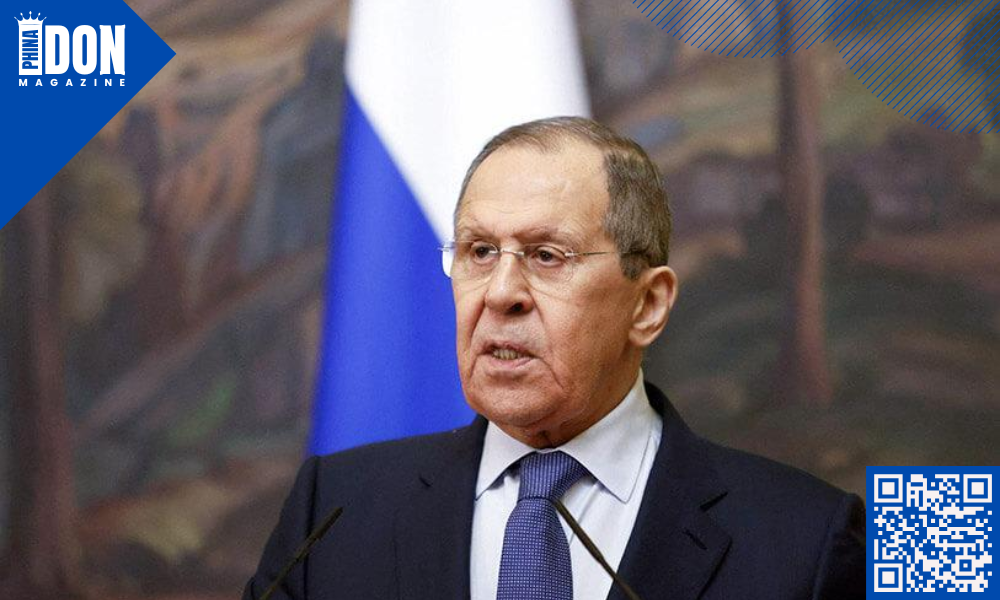Foreign
Russia’s Stance on NATO Troops in Ukraine: A Firm Rejection.

On Tuesday, Russian Foreign Minister Sergey Lavrov articulated Russia’s strong opposition to the presence of troops from North Atlantic Treaty Organization (NATO) countries in Ukraine. Speaking to reporters in Riyadh, Saudi Arabia, Lavrov emphasized that the involvement of NATO member forces as peacekeepers, even under a ceasefire agreement, is entirely unacceptable to Russia.
Lavrov stated, “The appearance of armed forces from the same countries, albeit under a foreign flag, under the flag of the European Union or under national flags, does not change anything in this regard.” This declaration underscores Moscow’s unwavering stance amid discussions by some European leaders, including British Prime Minister Keir Starmer, who have floated the idea of deploying peacekeeping forces to Ukraine contingent on a successful agreement.
Historically, Russia’s demands have included significant territorial concessions from Ukraine and the renouncement of its aspirations to join NATO—conditions that Kyiv has resolutely rejected. As the conflict nears its third year, U.S. Secretary of Defense Pete Hegseth has also indicated that Ukraine’s accession to NATO appears to be an unrealistic expectation in any potential negotiated settlement.
In parallel to these developments, former U.S. President Donald Trump has laid out plans intended to bring an end to the ongoing hostilities. As tensions persist, the geopolitical landscape in Eastern Europe continues to evolve, calling for careful diplomacy and dialogue.
Foreign
A court has mandated that the National Youth Service Corps (NYSC) permit female corps members to wear skirts.

In a landmark judgment, the Federal High Court in Abuja has declared the National Youth Service Corps’ (NYSC) policy of prohibiting female corps members from wearing skirts as unconstitutional. Justice Hauwa Yilwa, in a ruling delivered on June 13, 2025, found that the policy infringes upon the constitutionally protected rights to freedom of religion and human dignity.
The ruling came in response to suits filed by two former corps members, Miss Ogunjobi Blessing and Miss Ayuba Vivian, who argued that the mandatory trousers conflicted with their Christian beliefs, citing Deuteronomy 22:5. The court granted all reliefs sought by the applicants, affirming that the NYSC’s refusal to allow skirts for religious purposes is unconstitutional.
Justice Yilwa mandated the NYSC to recognize and permit the use of skirts for female corps members with genuine religious objections and directed the agency to recall the affected former corps members and issue their certificates. While the applicants sought N10 million each in damages, the court awarded N500,000 each, deeming it adequate compensation for the “harassment, embarrassment, and humiliation” suffered. The court’s decision underscores the importance of religious freedom within the NYSC program.
Entertainment
Nigerian Union in Denmark to Host 2025 Summer Picnic at Fælledparken, Copenhagen Denmark.

As the summer sun graces Copenhagen, the Nigerian Union in Denmark is gearing up for an unforgettable gathering to bring together Nigerians living in and around the city. On July 27th, 2025, from 2pm to 6pm, Fælledparken will be abuzz with laughter, camaraderie, and a joyous display of culture as the Union hosts its annual summer picnic.
Ambassador T. A. Elias Fatile, PHD, CDAai, the Head of Mission at the Embassy of Nigeria in Stockholm, Sweden, will attend the event. While the Queen Phinadon will serve as the MC at the Event. This well-anticipated event isn’t just about fun—it’s about weaving even stronger threads of connection amongst members of the Nigerian community in Denmark. We find it inspiring to see initiatives like this that go beyond mere socializing to focus on fostering unity, peace, and a continued sense of belonging so far from home. There’s a unique magic when familiar faces gather under the open sky, share stories, and celebrate with traditional warmth.
To foster a dynamic and engaged community for Nigerians in Denmark, They aim to: provide support to members facing challenges; encourage collaboration in social, economic, cultural, and political spheres between Nigeria and Denmark; and actively contribute to Nigeria’s development. Further aims and objectives are detailed in our constitution, accessible to members.
So, what’s on the agenda this year? For starters, there will be an energetic football competition—because, let’s be honest, nothing says “community” like a friendly match where everyone is a superstar, at least for a moment! If football’s not your thing, don’t worry: interactive games, the quirky and always amusing king game, dance sessions, and plenty more activities will keep spirits high and bring out hearty laughs from attendees of all ages.
And it wouldn’t be a true Nigerian get-together without music and dance! Picture a pop-up dance party on the green, with classic beats and contemporary hits bouncing through the park, inviting everyone to join in. For newcomers, these moments offer a gentle entry into the circle, and for longtime members, they provide the comfort of nostalgia.
As picnic baskets open, treats are shared, and new memories are created, the day promises not just entertainment but meaningful connections—some that may last a lifetime. Whether you’re bringing your family, friends, or just your good vibes, this is your invitation to celebrate, reconnect, and bask in the collective spirit of Nigerians in Denmark.
Mark your calendars for July 27th, gather your game face (and dancing shoes), and get ready to be part of something special in Fælledparken. We can almost hear the laughter already—and we wouldn’t want anyone to miss out on it!
Foreign
UK Deploys Military Assets to Middle East Amidst Escalating Iran-Israel Conflict.

In response to the escalating conflict between Iran and Israel, the United Kingdom is deploying fighter jets and other military assets to the Middle East. Prime Minister Keir Starmer announced the deployment, stating it is for “contingency support.”
The Prime Minister has engaged in discussions with both US President Donald Trump and Israeli Prime Minister Benjamin Netanyahu, emphasizing the need for de-escalation. Foreign Secretary David Lammy has also communicated with Iranian officials, urging restraint and emphasizing the importance of protecting civilians.
The UK’s actions reflect a commitment to regional stability and a concerted effort to prevent further escalation of the conflict. Ongoing discussions with allies aim to de-escalate the situation and promote a peaceful resolution.








